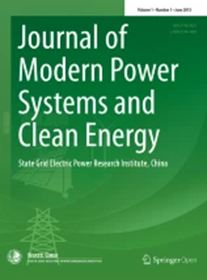多变馈系统振荡稳定性分析的频域自适应参数模型降阶方法
IF 6.1
1区 工程技术
Q1 ENGINEERING, ELECTRICAL & ELECTRONIC
Journal of Modern Power Systems and Clean Energy
Pub Date : 2024-11-27
DOI:10.35833/MPCE.2024.000390
引用次数: 0
摘要
计算资源有限的多变流器馈电系统的振荡稳定性分析需要精确的参数化降阶阻抗模型(PROIM)。然而,传统的基于Krylov子空间的参数化模型降阶(KS-PMOR)方法难以为mcfs建立精确的PROIM。这是因为与PROIM误差相关的因素是复杂和耦合的。为了填补这一空白,通过定义三个指标来估计与KS-PMOR方法精度相关的因素:收敛误差、累积误差和投影矩阵秩。利用这三个指标,建立了一种频域自适应参数模型降阶(FDA-PMOR)方法,形成mcfs的精确PROIM,用于精确、快速的振荡稳定性分析。通过3个不同规模的MCFS,即4台并联变流器可再生能源发电机(creg)的小型MCFS、18台并联可再生能源发电机(creg)的实时仿真MCFS和90台并联可再生能源发电机的大型MCFS,验证了基于FDA-PMOR方法获得的PROIM的准确性及其在实际振荡稳定性分析中的效率。本文章由计算机程序翻译,如有差异,请以英文原文为准。
Frequency-Domain Adaptive Parametric Model Order Reduction Method for Oscillatory Stability Analysis on Multi-Converter-Fed Systems
The oscillatory stability analysis of multi-converter-fed systems (MCFSs) with modest computational resources needs a precise parametric reduced-order impedance model (PROIM). However, the traditional Krylov subspace based parametric model order reduction (KS-PMOR) method has difficulty in building precise PROIM for MCFSs. This is because the factors related to the errors of PROIM are complicated and coupled. To fill this gap, the factors associated with the accuracy of the KS-PMOR method are estimated by defining three indicators: the convergence error, cumulative error, and rank of projection matrix. Using the three indicators, a frequency-domain adaptive parametric model order reduction (FDA-PMOR) method is developed to form the precise PROIM of MCFSs for the accurate and fast oscillatory stability analysis. The accuracy of the obtained PROIM using the proposed FDA-PMOR method and its efficiency in actual oscillatory stability analysis are validated by three MCFSs with different scales, i. e., a small-scale MCFS with four paralleled converter-based renewable energy generators (CREGs), a real-time simulation-based MCFS with eighteen paralleled CREGs, and a larger MCFS with ninety paralleled CREGs.
求助全文
通过发布文献求助,成功后即可免费获取论文全文。
去求助
来源期刊

Journal of Modern Power Systems and Clean Energy
ENGINEERING, ELECTRICAL & ELECTRONIC-
CiteScore
12.30
自引率
14.30%
发文量
97
审稿时长
13 weeks
期刊介绍:
Journal of Modern Power Systems and Clean Energy (MPCE), commencing from June, 2013, is a newly established, peer-reviewed and quarterly published journal in English. It is the first international power engineering journal originated in mainland China. MPCE publishes original papers, short letters and review articles in the field of modern power systems with focus on smart grid technology and renewable energy integration, etc.
 求助内容:
求助内容: 应助结果提醒方式:
应助结果提醒方式:


